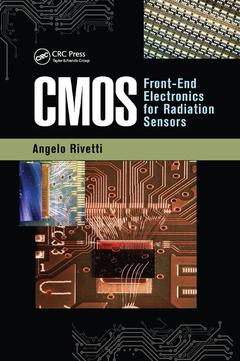Description
CMOS
Front-End Electronics for Radiation Sensors
Devices, Circuits, and Systems Series
Author: Rivetti Angelo
Language: English
Subjects for CMOS:
Keywords
Core Amplifier; ADC; CSA; Analog-to-Digital Converters; Front End Amplifiers; CMOS Technologies; Power Consumption; CMOS Transistors; Common Source Amplifier; Charge-Sensitive Amplifiers; MOS Transistor; Complementary Metal–Oxide–Semiconductor Technologies; Weak Inversion; Complementary Metal–Oxide–Semiconductor Transistors; Gate Source Voltage; Discriminators; Input Transistor; Front-End Electronics; Front End Electronics; I/O Circuits; M1 M2; Input/Output Circuits; Equivalent Circuit; Moderate Inversion; Vdd Vdd; Noise; Cascode Amplifier; Particle Detectors; PMOS Transistor; Pulse Shapers; Flicker Noise; Radiation Detectors; Transimpedance Amplifier; TDC; Bias Current; Time-Invariant Front-End Circuits; Strong Inversion; Time-Variant Front-End Circuits; Input Signal; Time-to-Digital Converters; Phase Margin; Small Signal Equivalent Circuit; electronics for radiation detectors; Complex Conjugate Poles; front-end electronics for particle detectors; Non-dominant Pole; Inversion Coefficient
Publication date: 07-2017
· 15.6x23.4 cm · Paperback
Publication date: 06-2015
· 15.6x23.4 cm · Hardback
Description
/li>Contents
/li>Readership
/li>Biography
/li>
CMOS: Front-End Electronics for Radiation Sensors offers a comprehensive introduction to integrated front-end electronics for radiation detectors, focusing on devices that capture individual particles or photons and are used in nuclear and high energy physics, space instrumentation, medical physics, homeland security, and related fields.
Emphasizing practical design and implementation, this book:
- Covers the fundamental principles of signal processing for radiation detectors
- Discusses the relevant analog building blocks used in the front-end electronics
- Employs systematically weak and moderate inversion regimes in circuit analysis
- Makes complex topics such as noise and circuit-weighting functions more accessible
- Includes numerical examples where appropriate
CMOS: Front-End Electronics for Radiation Sensors provides specialized knowledge previously obtained only through the study of multiple technical and scientific papers. It is an ideal text for students of physics and electronics engineering, as well as a useful reference for experienced practitioners.
Front-End Specifications and Architecture Overview. MOS Transistor Properties. Input Stages. Input Stages in the Frequency Domain. Noise. Time Invariant Shapers. Time Variant Shapers. Transistor-Level Front-End Design. Discriminators. Data Converters. Appendix: Differential and Operational Amplifiers. Appendix: Practical Aspects in Front-End Design.
Angelo Rivetti received a degree in physics from the University of Torino, Italy, and a Ph.D in electrical engineering from the Politecnico di Torino, Italy. From 1998 to 2000, he worked at the Conseil Européen pour la Recherche Nucléaire (CERN), Meyrin, Switzerland on the implementation of radiation tolerant integrated circuits in commercial deep submicron complementary metal–oxide–semiconductor (CMOS) technologies. From 2000 to 2001, he was an assistant professor with the faculty of physics at the University of Torino. In December 2001, he joined the Istituto Nazionale di Fisica Nucleare (INFN), Torino, Italy, where he developed very-large-scale integration (VLSI) front-end circuits now in use in the A Large Ion Collider Experiment (ALICE) and Common Muon and Proton Apparatus for Structure and Spectroscopy (COMPASS) experiments at CERN. He is currently a senior member of the research and technology staff at INFN. His research interests are in the design of mixed signal front-end electronics for hybrid and monolithic radiation detectors employed in high energy physics, medical imaging, and industrial applications.




